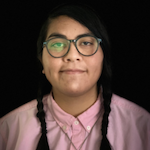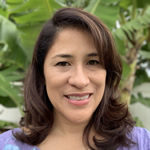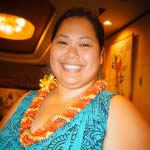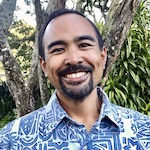This project studied the impact of (Re)Learning Waihoʻoluʻu on undergraduate Hawaiian Studies majors’ perception and interpretation of color. This was done by conducting a learning assessment that drew on Delorme’s (2018) Star Quilt Framework for Culturally Competent Instructional Design, and the Dick and Carey Model of Instructional Systems Design (2009). The presentation of the module’s content was shaped by Mayer’s (2014) Cognitive Theory of Multimedia Learning and place-based pedagogy, while tests emphasized authentic assessment.
The learning assessment consisted of three rounds, with revisions made to content and design following each round. Assessment of participants’ perception and interpretation were inconsistent, highlighting compact-learning limitations, design errors, diverse learner backgrounds, and challenges with an underdeveloped Hawaiian color theory. However, all participants self-reported changes in both interpretation and perception of color. Altogether, this study demonstrates the need for increased access and resources on Hawaiian color theory; indicates the Hawaiian community’s evolving attitude to e-learning; and illumines a demand for online learning in the Hawaiian Studies Department at the University of Hawaiʻi at Mānoa.
A recording of this presentation is available.
Click the button to the right to access the session archive.

 Kūʻiʻolani Cotchay is a graduate student in the M. Ed. Learning Design and Technology program at the University of Hawaiʻi at Mānoa, where she received a BA in Hawaiian Studies. She is an alternative educator, interested in creating and fostering learning environments external to the typical classroom. Future plans include creating an online Girls Rock Camp, developing educational content for Kānaka Maoli, and obsessing more about Kānaka Color Theory.
Kūʻiʻolani Cotchay is a graduate student in the M. Ed. Learning Design and Technology program at the University of Hawaiʻi at Mānoa, where she received a BA in Hawaiian Studies. She is an alternative educator, interested in creating and fostering learning environments external to the typical classroom. Future plans include creating an online Girls Rock Camp, developing educational content for Kānaka Maoli, and obsessing more about Kānaka Color Theory. Marcie Moura is a second year LTEC master’s student at the University of Hawaiʻi at Mānoa. For the past five years she has been teaching digital art at a private school in Honolulu, Hawai‘i. In her spare time she enjoys knitting and teaching others how to knit.
Marcie Moura is a second year LTEC master’s student at the University of Hawaiʻi at Mānoa. For the past five years she has been teaching digital art at a private school in Honolulu, Hawai‘i. In her spare time she enjoys knitting and teaching others how to knit. Jade Lum is a Ph.D. student and Graduate Assistant in English at the University of Hawaiʻi at Mānoa, where she also received her Master’s degree in English with a focus on literary studies. At the University of Hawaiʻi at Mānoa she teaches first-year writing composition, and has also taught an Introduction to Literature course with a focus on the fairy tale genre. Most recently, she published chapter work in the book Contemporary Fairy-Tale Magic: Subverting Gender and Genre. Her research interests include fairy tale studies, gender studies, adaptation studies, and visual and new media storytelling and rhetoric, particularly drawing from film and video game studies.
Jade Lum is a Ph.D. student and Graduate Assistant in English at the University of Hawaiʻi at Mānoa, where she also received her Master’s degree in English with a focus on literary studies. At the University of Hawaiʻi at Mānoa she teaches first-year writing composition, and has also taught an Introduction to Literature course with a focus on the fairy tale genre. Most recently, she published chapter work in the book Contemporary Fairy-Tale Magic: Subverting Gender and Genre. Her research interests include fairy tale studies, gender studies, adaptation studies, and visual and new media storytelling and rhetoric, particularly drawing from film and video game studies. Jaymian (Jaymi) Urashima is currently a PhD student at the University of Hawaii at Manoa in the Learning Design and Technology (LTEC) department. She completed her BA and MA at the University of Hawaii at Manoa in the Communicology department. Jaymi currently works as an Instructor/Course Director in the Communicology department, where she teaches public speaking and a variety of communication-related courses.
Jaymian (Jaymi) Urashima is currently a PhD student at the University of Hawaii at Manoa in the Learning Design and Technology (LTEC) department. She completed her BA and MA at the University of Hawaii at Manoa in the Communicology department. Jaymi currently works as an Instructor/Course Director in the Communicology department, where she teaches public speaking and a variety of communication-related courses. Dan Boulos is a classically trained animator and story artist with screen credits including Beauty and the Beast (Walt Disney Feature Animation), Space Jam (Warner Brothers Feature Animation) and The Prince of Egypt (DreamWorks Feature Animation). After more than a decade in the feature film industry in Los Angeles Dan moved to Honolulu where he founded Wiki Wiki Cartoons. During his years in Hawaii he developed animation programs for the University of Hawaii Community College System as well UH Manoa, the 4-year research campus. Also, Dan was a founding member of the European Animation Masterclass (EAM) a project of the European Media Fund which trained professional animators from EU member states. Dan has a Masters degree in Education (M.Ed. 2010) from the University of Hawaii at Manoa and a BFA from Cal Arts Character Animation (1989). His writing has been published in academic journals in both education and computer graphics and he has presented at academic conferences in the US, Spain and Switzerland. Dan has taught courses in traditional hand drawn full-animation as well as 3D CG-animation and various digital 2D and hybrid techniques. He is an active artist and filmmaker while continuing his work in animation scholarship.
Dan Boulos is a classically trained animator and story artist with screen credits including Beauty and the Beast (Walt Disney Feature Animation), Space Jam (Warner Brothers Feature Animation) and The Prince of Egypt (DreamWorks Feature Animation). After more than a decade in the feature film industry in Los Angeles Dan moved to Honolulu where he founded Wiki Wiki Cartoons. During his years in Hawaii he developed animation programs for the University of Hawaii Community College System as well UH Manoa, the 4-year research campus. Also, Dan was a founding member of the European Animation Masterclass (EAM) a project of the European Media Fund which trained professional animators from EU member states. Dan has a Masters degree in Education (M.Ed. 2010) from the University of Hawaii at Manoa and a BFA from Cal Arts Character Animation (1989). His writing has been published in academic journals in both education and computer graphics and he has presented at academic conferences in the US, Spain and Switzerland. Dan has taught courses in traditional hand drawn full-animation as well as 3D CG-animation and various digital 2D and hybrid techniques. He is an active artist and filmmaker while continuing his work in animation scholarship. Jeff Anderson grew up in San Jose, CA. Upon receiving his B.S. in Business Marketing from San Jose State University, he then moved to Arizona to start his career in Financial Aid. Jeff’s past work experiences involve multiple types of post-secondary institutions from private to public, and as a third party to on campus work. Finally bringing him to Kauai Community College as the Director of Financial Aid 7 years ago. He is a third-year LTEC master’s student at the University of Hawaiʻi at Mānoa who actively manages the Financial Aid office in the process of assisting students finance their pursuit of their educational dreams.
Jeff Anderson grew up in San Jose, CA. Upon receiving his B.S. in Business Marketing from San Jose State University, he then moved to Arizona to start his career in Financial Aid. Jeff’s past work experiences involve multiple types of post-secondary institutions from private to public, and as a third party to on campus work. Finally bringing him to Kauai Community College as the Director of Financial Aid 7 years ago. He is a third-year LTEC master’s student at the University of Hawaiʻi at Mānoa who actively manages the Financial Aid office in the process of assisting students finance their pursuit of their educational dreams. Growing up in Japan as an American and completing his education in the Japanese school system from kindergarten through high school was a life-changing experience, one that generated a fascination with technology, a passion for science fiction and his present professional dedication to international education and its inherent intercultural challenges. Casey Bales obtained his BBA at the Shidler College of Business and then began his career at Hawaii Tokai International College in the International Programs department where he creates educational programs for students of all ages. Now finishing up his LTEC master’s at the University of Hawaiʻi at Mānoa, he hopes to continue his path in education by applying what he’s learned to enhance educational practices in Japan and beyond.
Growing up in Japan as an American and completing his education in the Japanese school system from kindergarten through high school was a life-changing experience, one that generated a fascination with technology, a passion for science fiction and his present professional dedication to international education and its inherent intercultural challenges. Casey Bales obtained his BBA at the Shidler College of Business and then began his career at Hawaii Tokai International College in the International Programs department where he creates educational programs for students of all ages. Now finishing up his LTEC master’s at the University of Hawaiʻi at Mānoa, he hopes to continue his path in education by applying what he’s learned to enhance educational practices in Japan and beyond. Born and raised in the San Francisco Bay Area by naturalized U.S. citizens, Melanie Chan-Vinoray was the first in her family to earn a Bachelor’s degree. After earning a B.A. in American Studies from the University of California, Santa Cruz, she served two years in the Americorps National Service Program, working to increase academic achievement in a public school in Oakland, CA. Committed to serving historically and systemically underserved communities through the field of education, Melanie completed a state-approved secondary teacher preparation program at San Francisco State University to continue her work as an educator in public schools. Her commitment as a classroom teacher brought Melanie to Maui, HI, a decade ago. She continues to serve as a middle school teacher in the Hawai’i public school system and strives to spark students’ interests and passions in the classroom. Melanie’s studies in the LTEC graduate program will directly benefit public school students and has also provided her time for immense personal development. She is a second-year graduate student in the College of Education’s online LTEC program at the University of Hawai’i at Manoa.
Born and raised in the San Francisco Bay Area by naturalized U.S. citizens, Melanie Chan-Vinoray was the first in her family to earn a Bachelor’s degree. After earning a B.A. in American Studies from the University of California, Santa Cruz, she served two years in the Americorps National Service Program, working to increase academic achievement in a public school in Oakland, CA. Committed to serving historically and systemically underserved communities through the field of education, Melanie completed a state-approved secondary teacher preparation program at San Francisco State University to continue her work as an educator in public schools. Her commitment as a classroom teacher brought Melanie to Maui, HI, a decade ago. She continues to serve as a middle school teacher in the Hawai’i public school system and strives to spark students’ interests and passions in the classroom. Melanie’s studies in the LTEC graduate program will directly benefit public school students and has also provided her time for immense personal development. She is a second-year graduate student in the College of Education’s online LTEC program at the University of Hawai’i at Manoa. Morgan Mamizuka is the Volunteer Coordinator for the Hawaii Sea Grant Hanauma Bay Education Program (HBEP) in Honolulu, Hawaii and a graduate student in the Learning Design and Technology program at UH Manoa (LTEC). After receiving her B.S. in Agricultural Business from UH Hilo she began an internship with the HBEP. Working alongside HBEP staff and volunteers to educate visitors on the marine life and stewardship of Hanauma Bay Nature Preserve, she developed a passion for marine conservation and serving others. Since then she has led the HBEP’s Volunteer Program for 12 years. Her role as a Volunteer Coordinator is to recruit, train, and manage more than 100 volunteer docents who engage with the 800,000 park patrons each year. Morgan is excited to utilize the knowledge and skills gained through the LTEC program to enhance and elevate programs, activities, and educational resources offered by the HBEP.
Morgan Mamizuka is the Volunteer Coordinator for the Hawaii Sea Grant Hanauma Bay Education Program (HBEP) in Honolulu, Hawaii and a graduate student in the Learning Design and Technology program at UH Manoa (LTEC). After receiving her B.S. in Agricultural Business from UH Hilo she began an internship with the HBEP. Working alongside HBEP staff and volunteers to educate visitors on the marine life and stewardship of Hanauma Bay Nature Preserve, she developed a passion for marine conservation and serving others. Since then she has led the HBEP’s Volunteer Program for 12 years. Her role as a Volunteer Coordinator is to recruit, train, and manage more than 100 volunteer docents who engage with the 800,000 park patrons each year. Morgan is excited to utilize the knowledge and skills gained through the LTEC program to enhance and elevate programs, activities, and educational resources offered by the HBEP. Hongwei Shimizu received BA in Visual Media and MFA in Film & Electronic Media both from AU (American University). She has big passion in teaching, so she also gained Oxford Seminars’ TESOL/TESL/TEFL (100-HOUR) Certificate and Certificate in Greenburg PH.D. Teaching Seminar. Hongwei Shimizu now is a second year LTEC Master student at UH. She hopes she can contribute more and more in the education field of her Visual Media techniques and Multi-languages (Japanese, Chinese, and English) skills.
Hongwei Shimizu received BA in Visual Media and MFA in Film & Electronic Media both from AU (American University). She has big passion in teaching, so she also gained Oxford Seminars’ TESOL/TESL/TEFL (100-HOUR) Certificate and Certificate in Greenburg PH.D. Teaching Seminar. Hongwei Shimizu now is a second year LTEC Master student at UH. She hopes she can contribute more and more in the education field of her Visual Media techniques and Multi-languages (Japanese, Chinese, and English) skills. Aloha Everyone! My name is Kawika Gonzales. I am a part of the LTEC online master’s cohort since Fall 2019. I am also a 6th-grade teacher on the island of Molokai and have been teaching for the past 19 years. Besides the core general education classes, I also teach robotics, computer-aided design, and computer science. More recently, I have incorporated more virtual and augmented reality into my classroom. I am the math and grade level chair for our school and a part of the leadership team. My wife and I have 3 young boys, one in 1st grade and the other 2 in preschool. I enjoy taking them fishing and hunting.
Aloha Everyone! My name is Kawika Gonzales. I am a part of the LTEC online master’s cohort since Fall 2019. I am also a 6th-grade teacher on the island of Molokai and have been teaching for the past 19 years. Besides the core general education classes, I also teach robotics, computer-aided design, and computer science. More recently, I have incorporated more virtual and augmented reality into my classroom. I am the math and grade level chair for our school and a part of the leadership team. My wife and I have 3 young boys, one in 1st grade and the other 2 in preschool. I enjoy taking them fishing and hunting. Aloha! My name is Kalei Carvalho. I am currently in my first year of the LTEC Master’s program and anticipate graduating in May 2021. I originally started this program with only the hope of advancing in my career in the future. However, I am beyond grateful that I took this opportunity because it has been very beneficial in my current line of work. I currently work as a Student Support for the Wai’ale’ale Program, which is one of the first-year experience programs at Kaua’i Community College. I have lived on Kaua’i my entire life and use any opportunity I have to help strengthen our community. The biggest motivations in my life, however, are my husband and my children.
Aloha! My name is Kalei Carvalho. I am currently in my first year of the LTEC Master’s program and anticipate graduating in May 2021. I originally started this program with only the hope of advancing in my career in the future. However, I am beyond grateful that I took this opportunity because it has been very beneficial in my current line of work. I currently work as a Student Support for the Wai’ale’ale Program, which is one of the first-year experience programs at Kaua’i Community College. I have lived on Kaua’i my entire life and use any opportunity I have to help strengthen our community. The biggest motivations in my life, however, are my husband and my children. Judy Kakazu received her BA in Zoology after switching her major no less than 7 times. As a result she knows very little about a lot of things. Judy then decided that she would take a break from academia and learn something fun. As a result, Judy has been a paramedic with the 911 system on Oahu for 30 years. Intermittently returning to the academia that she vowed never to return to, Judy has been fortunate to study subjects such as Human Physiology at the graduate level. After a recent work injury, Judy was given the opportunity to explore Learning Design and Technology at UH Manoa. As a first year student in the online Master’s program and under the mentorship of all within this excellent department, Judy is truly grateful and hopes to continue the privilege of learning, forever. Some of her interests include the gamification of learning, endocrinology and thinking outside of the box…
Judy Kakazu received her BA in Zoology after switching her major no less than 7 times. As a result she knows very little about a lot of things. Judy then decided that she would take a break from academia and learn something fun. As a result, Judy has been a paramedic with the 911 system on Oahu for 30 years. Intermittently returning to the academia that she vowed never to return to, Judy has been fortunate to study subjects such as Human Physiology at the graduate level. After a recent work injury, Judy was given the opportunity to explore Learning Design and Technology at UH Manoa. As a first year student in the online Master’s program and under the mentorship of all within this excellent department, Judy is truly grateful and hopes to continue the privilege of learning, forever. Some of her interests include the gamification of learning, endocrinology and thinking outside of the box…